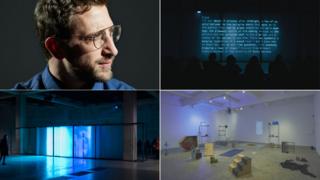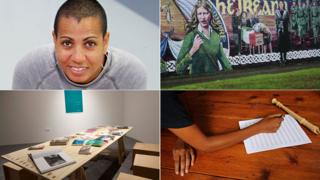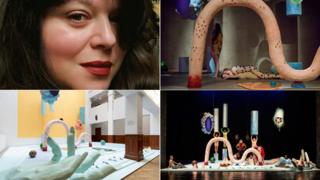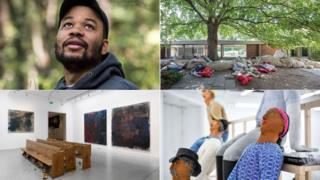Image copyright
Press handout
Clockwise from top left
The four artists competing for this year’s Turner Prize have been announced with investigative art, works blurring fact and fiction and explorations of oppression dominating the shortlist.
The nominees are Jordanian Lawrence Abu Hamdan, London-based Helen Cammock and Tai Shani and Colombian Oscar Murillo.
Their works will go on show at the Turner Contemporary in Margate from 28 September until January 2020.
The winner is announced on 3 December.
Arts editor Will Gompertz has been looking at the artists and their work.

 Image copyright
Image copyright
Lawrence Abu Hamdan
Beirut-based Lawrence Abu Hamdan is an artist more interested in the ear than the eye. He thinks of himself as an “audio investigator” who makes films, installations, and gives performative lectures based on earwitness (not eyewitness) accounts from oppressed individuals, or, in another project, from racially-profiled individuals who are being judged on the basis of how they pronounce certain words or syllables.
 Image copyright
Image copyright
Helen Cammock
Helen Cammock is also interested in sound and history. She too makes films and gives spoken word performances. But her area of investigation is past events and their histories; not a single, definitive written account but a variety of views and texts, which can be perceived differently when spoken by other people.
 Image copyright
Image copyright
Tai Shani
Fellow London-based artist Tai Shani shares Cammock’s interest in the written word and associated assumptions, depending on the gender and perceived status of the author. She also organises performances, makes films, and creates installations. The difference with Shani is she’s not that interested in multiple viewpoints of history, more in creating alternative, almost gothic worlds that blur fact and fiction, or truth and myth, with the intention of disrupting a real world dominated by, and centred around, a white, western, male point of view.
 Image copyright
Image copyright
Oscar Murillo
Oscar Murillo is a Colombian-British artist and the most established name on the shortlist. He became an instant art world hit when he first emerged on the scene six years ago. His work made huge sums for a relatively unknown 20-something artist. Things cooled for a bit – but now he’s back, with his semi-abstract paintings on unstretched canvasses hanging limply like curtains in a bedsit with too few hooks. They are, in a way, more like objects in an installation than pictures to put on a wall. He, like his fellow nominees, is exploring the politics of identity, oppression, and marginalised people.

The winner will be announced on 3 December 2019 at an award ceremony broadcast live on the BBC.
Follow us on Facebook, on Twitter @BBCNewsEnts, or on Instagram at bbcnewsents. If you have a story suggestion email entertainment.news@bbc.co.uk.
